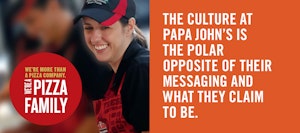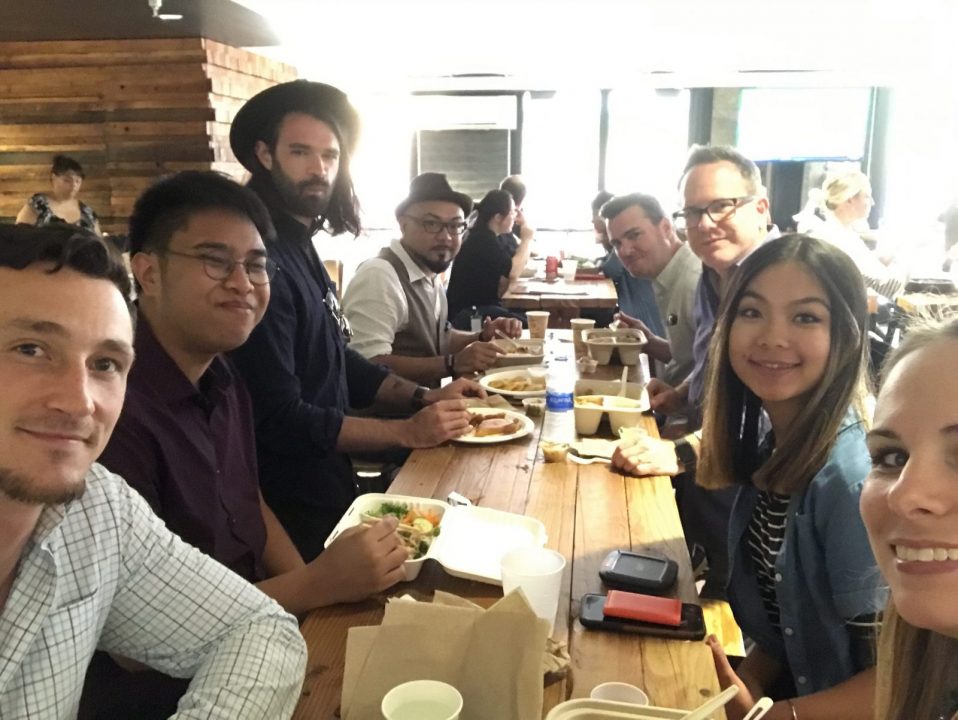How Company Culture Shapes Brand Success
For better or worse, what you believe is a huge part of what your brand delivers. Just ask Papa John’s.
Setting the stage
What do you do when your brand identity is based on a person and that person is being forcibly removed from the company?
This is the situation Papa John’s Pizza currently finds itself in. John Schnatter’s constant racist references and comments had tainted consumers’ opinions of the pizza brand and now sales are falling. Many think simply removing the former CEO’s likeness from the branding materials is enough to make the problem go away, but what exactly does that entail? Think of all the print ads, in store signage, pizza boxes and delivery trucks his face is on. Not to mention the name. Does Papa John’s simply become Papa J’s? And then there are the franchisees to consider. What do the franchisee contracts say about handling the brand? Are the contracts all the same? How much money will it all cost and who is going to pay for it?
While these, and many other questions, are top of mind for everyone over at Papa John’s right now, it’s still not the right question. The question that should be asked is, how did a successful company ranked #1 in customer satisfaction find its consumer sentiment numbers plummeting?
Authenticity is king
First, we need to understand how customers make their choices. While product quality is important, it isn’t the only thing they consider. It really comes down to brand—not just brand name, but the brand as a whole—the customers’ perception of the organization.
Today, perception is based on more than just marketing—it’s about authenticity. It’s about a brand’s promise matching up with its actions. When customers find out that a brand’s actions contradict its messaging, they start to doubt what they’ve been told and lose faith.
Practicing what you preach
In the case of Papa John’s Pizza, they consider themselves to be “The Champion for Better.” But, while their pizza is made with better ingredients, evidence shows this idea does not apply to its own employees.
Papa John’s refers to themselves as ‘a people company that makes pizza.’ In their 2016 annual report, they describe their culture as ‘being grateful for everything and entitled to nothing… about being kind and respectful… and learning from mistakes.’
Based on this, one would expect Papa John’s to be a place where all employees are treated with respect, where the leadership expresses humility and people are promoted based on the quality of their work. Instead, Schnatter blamed weak pizza sales on ‘poor leadership’ by the NFL and made racist comments during a media training call. Executives laughed at jokes filled with overt sexual requests, and people were promoted based on their relationships with Schnatter and CEO Steve Ritchie.
The culture at Papa John’s flies in the face of what they claim to be.

Values are more than just words on a wall
Unfortunately, the contradictions go way beyond how Papa John’s Pizza views themselves and into their values. Values should serve as a company’s moral compass and be non-negotiable. They are the foundation for how companies make decisions: who to hire, who to fire, who to work with and how to behave.
But that is not the case for Papa John’s. It’s obvious when you consider one of their six values is ‘accountability.’ And yet, the operations executive who talked about porn with female employees and showed inappropriate images to co-workers was promoted to Regional VP. Even the executive who was asked to leave for mistreating employees was not held accountable in the long run, as he was later re-hired and is now part of the C-Suite.
With all these contradictory behaviors, it should come as no surprise that customer sentiment is falling. The Papa John’s brand is inauthentic, and customers no longer trust them.
It all starts with leadership
So, what happens now? How can Papa John’s regain customer’s trust?
1. Papa John’s Pizza needs to apologize. Not an empty PR statement or apology ads, but a full mea culpa—an unqualified, heartfelt apology that contain the words ‘we’re sorry.’
2. They need to overhaul the leadership. Does the existing leadership believe in and uphold their own values? If not, it’s time to get off the bus.
3. They need to determine a game plan for distancing themselves from John and need to accept that it won’t be easy. Making things right is not going to be cheap and could take years depending on franchisee contracts and compliance.
4. Papa John’s needs to re-evaluate their purpose and values. What is it that makes the company tick? These need to be realistic, not just what will make the company look good.
5. And finally, they need to institute employee experience practices that will continuously reinforce the purpose and values. This includes hiring practices, employee recognition programs, etc.
The number one thing to remember, it all starts with leadership. If the leadership is held accountable, if their actions are held to the company’s values, then everyone else will fall in line. If the values are used to make decisions, they will act authentically. But, if the leadership is allowed to behave contrary to the values of the organization, then customers will know their values mean nothing and the brand can’t be trusted.
We call it brand culture. Let’s talk.


